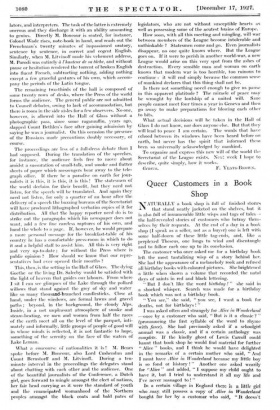Queer Customers in a Book Shop
NATURALLY a book shop is full of finished stories that stand neatly jacketed on the shelves, but it is also full of innumerable little wisps and tags of tales— the half-revealed stories of customers who betray them- selves by their requests. At the end of a day in a book shop (I speak as a seller, not as a buyer) one is left with some half-dozen of these little tag-ends, and, like a perplexed Theseus, one longs to wind and disentangle and to follow each one up to its conclusion.
The customer who once asked me for a birthday book left the most tantalizing wisp of a story behind her.
She had the appearance of a melancholy rook and refused all birthday books with coloured pictures. She brightened a little when shown a volume that recorded the natal days of saints in red and black lettering.
" But I don't like the word birthday ! " she said in a shocked whisper. Search was made for a birthday book which was not a birthday hook.
" You see," she said, " you sec, I want a book for deaths, not for birthdays ! "
I was asked often and strangely for Alice in Wonderland —once by a customer who said, " But is it a classic ? "
(pronouncing the first syllable of the word to rhyme with. farce). She had previously asked if a schoolgirl annual was a classic, and if a certain anthology was complete. If the kindly ghost of Lewis Carroll could haunt that book shop he would find material for further " Alice " books, and I think he would have delighted in the remarks of a certain mother who said, " And I must have Alice in Wonderland because my little boy is so fond of history ! " Another one asked wearily for "Alice " and added, " I suppose my child ought to have it, but I tried to understand it all my life and I've never managed to ! "
In a certain village in England there is a little girl who .may_ still possess a copy of Alice in Wonderland bought for her by a. customer who said " It doesn't matter about the illustrations. Tenniel's will do quite well as the book is only for the doctor's child."
• But those who sell books are asked for many other things beside. They may be requested to supply crackers and tea, and consulted as to which is the most suitable present for one-year old twins—" rubber balls or squashy dolls." And people other than customers come into book shops. I remember a woman with a Pekinese dog, who came ostensibly to buy books but really to sell fortunes. She had a slow, hissing way of speaking. " Would you like me to tell your fortune ? " she asked. " I could read your future in a glass of water. Water and earth are natural elements. If you will come to my house one evening, I will read your fortune in a glass of water, for half a guinea." Then she picked up her dog and went away and I was left thinking of the Spider and the Fly—" Will you walk into my parlour ? "
In The Haunted Bookshop Mr. Christopher Morley describes a conversation between the manager of a shop and his assistant : the latter is told that if a customer asks for a volume of poems about a type-writer he should be quick to understand that the book required is Steven- son's Underwoods. I remember a customer who asked for a book on fish by Fabre, with a picture of the author on the cover.
" But I saw it, five minutes ago," she declared. But what she had seen was a book named- Stiffly that had a picture of a large, fierce-looking pike on the front page.
" That's the one; of course ! " said she and continued to look as indignant as though she had been purposely prevented from buying an autobiography of a fish.
Children are the pleasantest of all customers, for they know exactly what they want. I remember two little girls with apple-blossom faces, who wore fur-trimmed bonnets and purple coats.
" I want a book for Daphne," said the elder of them.
" And will you see that Daphne keeps her eyes shut while I choose it, please ? "
• Perhaps the most delightfully reasonable request I ever heard was that of a customer who came to the juvenile section and asked for a book " for a very old lady who is in her second childhood and is fond of fairies."
Then there was the mysterious man who asked for a selection of books to be put aside for him, saying that he would call the next morning. When asked for his name,. he hesitated, stammered, and said, " Say H. Brown." Now, who, since he was not H. Brown, was he ? He was a poor deceiver.
Perhaps stories are magnets for stories. Perhaps there is something in the air of a book shop, some magical quality in the dust of books. Where else in the world would a young man customer turn to a woman customer and say, " Excuse me, but I wonder if you could tell me of any magazines that buy sonnets. I've written some and I want to sell them." If the request had been made in some art-and-crafty little place, where the books wear chintz jackets and are sold by ladies in djibbas, and where free-verse mongers drift and droop, it would not have been so remarkable. But those two people had come to buy books in a good, old-fashioned family book shop-and they had -never met.
There must be a magic in the dust of a book shop.
A BOOKSELLER.







































 Previous page
Previous page